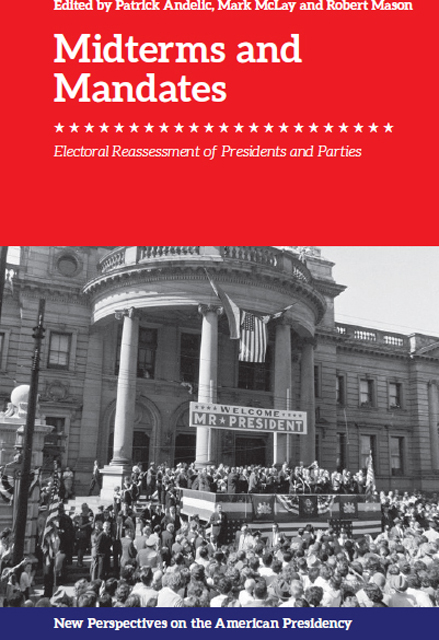Book contents
- Frontmatter
- Contents
- List of Figures and Tables
- Acknowledgements
- Notes on Contributors
- Preface: Why Midterms Matter
- Introduction: Midterms and Mandates, Presidents and Parties
- Part One Midterm Elections in Institutional Context
- Part Two Testing the New Deal Coalition
- Part Three The Republican Resurgence
- Index
5 - The Domestic Politics of War: Franklin D. Roosevelt and the 1942 Midterm Elections
Published online by Cambridge University Press: 07 June 2023
- Frontmatter
- Contents
- List of Figures and Tables
- Acknowledgements
- Notes on Contributors
- Preface: Why Midterms Matter
- Introduction: Midterms and Mandates, Presidents and Parties
- Part One Midterm Elections in Institutional Context
- Part Two Testing the New Deal Coalition
- Part Three The Republican Resurgence
- Index
Summary
At a 30 October 1942 press conference, President Franklin Roosevelt issued a brief statement on the following week’s midterm elections. Expressing his hope that all Americans would go out and vote on 3 November, he stated that ‘we are engaged in an all-out war to keep democracy alive. Democracy survives through the courage, fortitude and wisdom of many generations of fighting Americans. And that includes using not only bullets but also ballots.’ Despite the ongoing nature of World War II, midterm elections continued as usual. Elections had taken place during previous American wars, and it was important that they took place during this war, a war being fought in the name of democracy against the forces of fascist dictatorships.
Yet, despite the unusual wartime nature of the 1942 midterms, these elections have been largely overlooked. Historian Sean Savage notes that not enough has been written on the 1942 elections. In one of the few books to examine the significance of midterm elections, government scholar Andrew Busch deems 1942 a ‘normal midterm’ largely because the party of the president saw losses in Congress, though that party did not go on to lose the White House in the next presidential election. Studies of the war and of the Roosevelt years tend to come to similar conclusions. Robert Dallek describes the outcome as ‘typical of a midterm election’. James MacGregor Burns, paying more attention to the elections than most, still describes it as ‘a typical off-year congressional election, hardly influenced by the great issues of war and peace’.
However, World War II significantly affected the 1942 midterms. In fact, the war defined the elections. The outcome of the elections may be seen as ‘normal’ – congressional losses for the party of the presidency – but the context and the conduct certainly cannot be seen as that of a normal midterm. An examination of that context highlights the importance of contingency in 1942. The idea of a ‘normal midterm’ suggests that Democratic losses were inevitable in 1942, but this was not the case. The specific nature of the war and the home front clearly affected the election results. Polls suggest that, had the elections come a few months earlier, the results could have been very different. Similarly, had the elections come just a few weeks – or even days – later, then the results could have been far better for the Democrats.
- Type
- Chapter
- Information
- Midterms and MandatesElectoral Reassessment of Presidents and Parties, pp. 119 - 142Publisher: Edinburgh University PressPrint publication year: 2022



